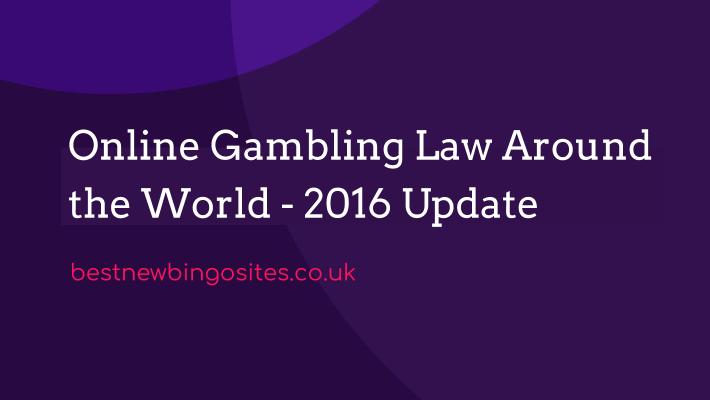
Online Gambling Law Around the World - 2016 Update

-
Updated: 6th Aug 2024
This is an article originally published in 2013 and updated in 2016. Many changes have taken place since then, both in the UK and elsewhere in the world.
A youthful industry
1994 was an important year in gambling history – offline and online. What happened offline was the introduction of the UK National Lottery which arguably has done a huge amount to make gambling a socially mainstream activity. Online saw both the beginnings of online casinos with the founding of Microgaming (although the first true online casinos did not arrive for another year or two) and the beginnings of regulation with the first licensing legislation on the part of Antigua and Barbuda (with the better known jurisdictions such as Gibraltar and Alderney coming to the party years later).
The industry itself is thus younger than the vast majority of its workers and consumers – and MUCH younger than those responsible for developing the legal framework under which online gambling sites are to operate – so it is hardly surprising that developments in regulation are occurring at such a rapid pace!
UK vs the rest of the world
Here in the UK, online gambling is legal and prior to November 2014 in order to advertise in the UK, bingo sites and other online gambling sites had to be licensed somewhere that met UK standards for fairness, prevention of underage gambling and assistance for problem gamblers. Those places were the UK itself, EU (including Malta), Gibraltar, Alderney, Isle of Man, and Antigua and Barbuda but all the regulation was brought onshore in November 2014 and as of Spring 2016 the effects of this are really beginning to be felt throughout the industry with crackdowns taking place with respect to advertising and social responsibility in general . In addition, in December 2014 the UK began taxing all gambling at the point of consumption – so if the player is located in the UK, it does not matter if the company’s offices and server are elsewhere in the world, they still have to pay UK tax on the transaction. It will be interesting to see whether this sort of point-of-consumption tax is applied in the future to organisations in other industries that use offshore tax havens, e.g. taxing the Starbucks coffee in the place where it is drunk.
The UK’s approach to online gambling is comparatively liberal, as it happens. A great many countries such as Singapore either do not allow remote gambling sites to be operated on their soil or seek to prevent their citizens from gambling remotely, or both. Perhaps the most interesting case is Costa Rica which allows online gambling sites to be based there without any regulatory framework or taxation – the only proviso being that no wagers may be taken within the borders of Costa Rica from Costa Ricans!
The UK’s decision to legalise/regulate/tax has also placed it in the forefront of the industry and provided employment for many, both in the UK itself and in overseas locations such as Malta and Gibraltar.
But which is the right approach? Ban/enforce, or legalise/regulate/tax? There’s no denying that problem gambling gives rise to a whole slew of social evils – including extreme effects such as large-scale theft and fraud to cover up gambling debts, and families being broken up and/or rendered homeless. Clearly this is very undesirable and if possible, should be stopped from happening. But does banning gambling actually stop problem gamblers from doing it? Conversely, does making gambling legal cause more people to develop a gambling problem – or does it merely bring the problem out into the open?
Banning and regulating are mutually exclusive
Imagine, if you can, a parallel world in which someone in the corridors of power made a different decision a few years back, resulting in there being a ban on all online gambling in the UK. Suppose you decided to play bingo online anyway (in the knowledge that the police have much better things to do than look for players of illegal bingo!) What sort of site would you be playing at? Would the bingo there be fair or could it be fixed? Do you think they would care about your age (if under 18)? And what do you think your chances of cashing your winnings out would be?
With the current set-up, you have the choice of a large number of new UK bingo sites to play at that all meet legal standards for fairness, protection of minors, responsible gambling and safety. If it is true that people would still play bingo regardless of whether it was legal or not, then clearly regulation gives them a great deal of protection in those areas that they wouldn’t otherwise have. Regulated gambling sites can be required (and ARE required, by the UKGC) to put a raft of player protection measures in place as a condition of their licence whereas the only thing that can be done about illegal sites is to try to shut them down.
It is not surprising that the UK has taken the legalise/regulate/tax route, given the history of gambling in this country. In 1906, for instance, street gambling was banned by law but this law turned out to be completely ineffective – it was supposed to protect the poor by preventing street gambling but in fact gambling carried on as before; there were just more arrests. A ban only works if it actually causes the thing that is banned to stop, and in history there are very few cases of bans on anything whatsoever (apart from in totalitarian states) that actually stopped the banned behaviour, even if it was something physically taking place within the country boundaries rather than virtually on the Internet. The classic example of this is of course Prohibition under which the illegal alcohol industry was worth $3 billion a year. Contrast this with the very successful UK Smoking Ban – which is not actually a ban at all but a form of very restrictive regulation (people can still choose to smoke but only at certain times/in certain places where it will not endanger the health of others, and cigarettes are heavily taxed and carry very clear warnings about the danger to health).
A further argument against a ban is that banning something that people are prepared to pay for puts the supply of that thing into the hands of organised crime (as happened in the USA during Prohibition) and this is bad news for everyone apart from the crimelords themselves.
Comparing a legal casino with an illegal one
Let’s leave the online part of it out for a moment and imagine two land based casinos in two different countries. In country A the casino operates legally, but just across the border in country B all gambling is banned so the casino is a secret operation (much like the speakeasies of Prohibition-era USA).
- Which casino is more likely to have fair games?
- Which casino is more likely to pay out winnings?
- Which casino is more likely to keep underage players out?
- Which casino is more likely to have a policy regarding problem gamblers?
- Which casino is safer to play at?
- Which casino provides employment and investment opportunities?
- Which casino contributes to the local economy via taxation?
Given all that it seems unlikely that anyone not themselves engaged in nefarious activities such as money laundering is going to choose to play at the “bad” Casino B if they have the option of “good” Casino A – but what if they can’t get to Casino A? Will someone who is addicted to gambling be put off visiting Casino B if the alternative is not gambling at all, just because Casino B is illegal?
On the internet, the casino comes to you
In the land based casinos example the police could find out the physical location of Casino B and go round there and shut it down and arrest everyone – but they can’t do this with Casino A because it is physically located in a different jurisdiction where it is not breaking any laws. All they can really do about Casino A is close the border so no-one can get there, seize any winnings if players attempt to bring them back into the country, punish anyone found to have been playing there or ask the local authorities nicely not to allow their citizens into the casino .
With internet gambling the police (whoever they are, not the regular police force presumably) have a much bigger problem as neither Casino A nor Casino B (nor any of the thousands of other online casinos) need be in any way physically located in the country to be easily accessible – so even if they can find out where the casino is they are unlikely to have the authority simply to shut it down!
Governments are then faced with a choice of whether to treat Casino A and Casino B alike and ignore the differences in fairness and safety between them (a blanket ban) or recognise those differences (some form of regulation that favours the “good” casino over the bad one).
Enforcement options
Here’s some of the possible ways the government of a country could go about enforcing a gambling ban:
1) Tell people not to do it, by means of public information ads, leaflets etc. Some people may be put off by this (although this sort of campaign has not had particularly good results when used to try and dissuade people from smoking, drinking to excess or drug taking) – but the ones who are, are likely to be ordinary law-abiding adults who do not have a gambling problem and can take it or leave it . But there are an estimated 6 to 8 million people in the US alone with some kind of a gambling problem, according to the National Council on Problem Gambling. What of them?
2) Attempt to shut down/ prosecute foreign gambling sites that accept players from your country, under international law or your own country’s laws. This only works if the jurisdiction that the site is based in recognises your country’s laws and since the foreign gambling site can just move to a different jurisdiction and domain name, even then it is not very effective. In the case of Antigua and Barbuda, the World Trade Organisation took a very dim view of USA actions. Interestingly the UK does take an interest in gambling laws elsewhere in the world – one of the things that must be reported on when applying for a UKGC licence is any significant involvement in grey markets. The way forward for enforcement against unlicensed foreign gambling sites seems likely to be via international law and international co-operation by organisations such as the European Gaming and Betting Association.
3) Ban the banks in your country from processing (identifiable) payments to and from online gambling sites – as the US has attempted to do. This resulted in Internet payment processing giant Neteller being forced out of the country entirely and millions of dollars of customer funds being frozen. Many US residents have managed to play anyway, making deposits via prepaid cards, wire transfer or even in cryptocurrencies and to combat this would require the sort of heavy handed enforcement seen in Russia where the government wants to introduce jail terms for Bitcoin users.
4) Attempt to block every single gambling site in the world from being accessed from any device that is geographically located in your country. The geo-location part of this is easy enough but only if you can get the co-operation of the gambling sites; in Nevada, for instance, geo-location is used to ensure that anyone using the legal online gambling sites there is physically located inside the state boundary, and this is enforceable because the gambling sites are required to do it as a condition of getting and keeping a licence. This is analogous to regulating the door policy at the local casino; if what you actually want to do is unilaterally ban everyone from visiting any casino in the world ever, the problem becomes one of making a list of every single gambling site in the world, keeping it up to date and ensuring that every single method of accessing the internet from inside your country (including via a proxy server) blocks all and only those sites. Any short cut method such as blocking any URL that contains the word “casino” will let some gambling sites through – Spin Genie, for instance, does not contain the word – and block some sites that are nothing to do with online gambling – such as the Amazon product listing for the James Bond film Casino Royale. Block every word that might have anything to do with gambling and you’ll end up censoring massive swathes of the internet, on a par with countries such as China or Saudi Arabia.
5) Don’t bother trying to shut the casino down, just punish your citizens if they are caught gambling. That’s what currently happens in Vietnam, where betting on football can earn you a hefty prison sentence. This will only be effective in preventing gambling if the enforcement is consistent enough for the threat of punishment to deter other would-be gamblers – and that could end up being very expensive in terms of police time and resources. The Vietnamese government allegedly has legislation in the pipeline to legalise/regulate/tax but this has been the case for a few years now and shows no sign yet of actually being signed into law any time soon.
6) In February 2015 Singapore introduced probably the toughest anti online gambling law in the world, criminalising gamblers, gambling sites, payment processors and internet service providers alike. This looks like a serious case of “all of the above” and Singapore, which has famously been described as “Disneyland with the death penalty”, certainly has enforcement that is sufficiently heavy handed to make it stick (penalties of up to $5000 or 6 months’s imprisonment for gamblers) but in fact, this legislation does not impose a total ban on gambling, just super restrictive regulation as there is the potential for sites to apply for a Singapore licence – IF they are physically based in Singapore and contribute a portion of proceeds to local charitable and/or social causes – and Singapore also has (extremely tightly regulated) bricks and mortar casinos.
What might people who don’t have a gambling problem do if gambling is made illegal?
1) If they work in the gambling industry, make a living playing poker or even just enjoy gambling they might leave the country or if possible move within the country to somewhere that allows gambling. In the USA, for example, one would expect to find a concentration of gamblers and gambling industry workers in Las Vegas and Atlantic City.
2) If they gambled just for the entertainment value, they find somewhere else to spend their money – that could be a legal casino in an adjacent country or state (Vietnamese gamblers, for instance, visit casinos in Cambodia and the land based casinos in Nevada attract visitors from all over the USA), it could be a legal activity that feels similar to gambling (such as social gambling) or it could be some other form of entertainment entirely.
What might people who DO have a gambling problem do if gambling is made illegal?
If they are unable to access legal gambling options by moving to or visiting a different jurisdiction, here are some of the things gambling addicts have been known to do:
1) Go underground and play at illegal sites where there is no regulation or protection – and if caught they may be criminalised.
2) Find some other activity that pushes the same buttons and tell themselves that it isn’t gambling. Day trading on the stock market, especially using leveraged products, is very close to being gambling; in the UK some of the products are even referred to as bets – and yet according to their annual report, out of nearly 140,000 calls to the Gamcare Helpline and Netline during 2013 – 2015, hardly any (1 or 2 in 2014-15 and 4 or 5 in 2013-14) were concerning financial spread betting or the stock market. That is almost beyond belief! One need only spend a little time perusing day trading forums to see that there are a great many out-of-control losers. The answer has to be that even if someone in that position recognises that they have a problem, they aren’t thinking of it as a gambling problem. In the USA, the controversial DFS (daily fantasy sports) industry has been filling this niche.
3) Go crazy on scratchcards – which are generally freely available as part of government run lotteries and push most of the same buttons as casino fruit machines:
- No skill, just luck
- A very small chance of a life changing win
- A short payout interval (instant)
- A rapid “event frequency” (no need to wait for a draw to play again, just buy another card straight away)
- The illusion of scoring a near miss (match 2 symbols instead of 3)
What gambling addicts certainly will NOT do is magically stop having a gambling problem simply because there are no legal gambling options – in a 2016 study of problem gambling prevalence across the USA, the state that ranked second for problem gambling was Hawaii – where there are indeed no legal gambling options and where (because of its location a long way from the mainland USA) there is no easy way to access legal gambling in an adjacent state. Hawaii’s high ranking was partly to do with the number of gambling related arrests whereas Utah, a state that also allows no gambling whatsoever, had the fewest gambling related arrests, perhaps because Utah residents need only cross the state line into Nevada to access a multitude of legal gambling options.
Where does social gambling fit in?
What about social gambling such as DoubleDown Casino, or the bingo apps on Facebook? You can spend real money on those games – and some people undoubtedly do spend quite a lot, especially since the very lack of regulation allows social gambling apps to include all sorts of fun content (power-ups and so forth) that would never be allowed on a real money gambling site; for an example of this we need only look at the differences between the original and real money versions of Slingo. There are also a great many other games on social media that encourage you to spend real money and some of them blur the line between entertainment and gambling. Buying power-ups and extra lives is one thing – but gambling real currency in-game (on a spin-the-wheel or scratchcard type scenario) for in-game items is another, and the reason it doesn’t come under gambling legislation is that you can put your money in, but never get it out again. Should there be more regulation in this area? Is this really compulsive spending rather than compulsive gambling? And are some cases of compulsive gambling really cases of compulsive spending? As it happens, the UK is taking steps to regulate this area further, with particular reference to premium content being marketed to children in unsuitable ways, and apps being described up front as free when in fact it is impossible to progress without spending real money.
The UKGC has also started to take a hard line on forms of gambling done in digital commodities such as in-game currency rather than in real money, with the first prosecution being brought in Autumn 2016 for running this type of site and promoting it to minors.
Why is gambling so addictive anyway?
Well, firstly, humans in general have an extremely poor grasp of risk and reward. Let’s take a lottery as an example. The chances of winning the jackpot in the Euromillions is 1 in 139,838,160 (it used to be around 1 in 116 million before the 2016 rule change). That is less likely than flipping an unbiased coin 26 times in a row and getting all heads – and is an example of an extremely unlikely event with a huge reward. On the other hand, the results of a 2006 European study into smoking and lung cancer put the probability of developing lung cancer in men who smoke more than 5 cigarettes a day at 24.9% (almost 1 in 4, or about as likely as getting two heads when you flip a coin twice). It was 0.2% in men who had never smoked and 5.5% in male ex-smokers. That is an example of a relatively likely event with a huge negative consequence. So why do people buy lottery tickets and fantasise about what they will do with the winnings, but continue to smoke without thinking about their hugely increased risk of death? It kind of makes sense to buy just ONE lottery ticket, if you look at it as donating £2.50 to a good cause in exchange for the opportunity to dream about how you would spend millions – but it makes very little sense to buy more than one ticket. When you buy two tickets, you double the almost certain downside (the cost of the ticket) in order to increase your chance of winning from 1 in 140 million to 1 in 70 million. Both those chances are so near zero that from the other end of the bet, they would be considered a vanishingly small risk (and vanish is what your money does). Basically, people buy lottery tickets because they think it WILL happen to them, and fail to quit smoking because they think it WON’T happen to them. We can’t compare the probabilities directly because the lottery one is for a single lottery draw and the cancer one is a lifetime risk – but roughly speaking, a male smoker would need to do the lottery once a week for hundreds of thousands of years to make the chances of a lottery jackpot win at some point come anywhere close to his chance of developing lung cancer in the remainder of a normal lifetime.
Secondly, humans have a tendency to have an emotional investment in gambling wins and losses and many of us haven’t really moved on from the state of the 2 year old who bursts out crying after losing a game of Snakes and Ladders. The payback from a win more than makes up for the bad feeling for the losses (even if the same cannot be said financially). This leads to the feeling that one is “owed” a win and chasing losses to try and get one. Problem gamblers feel bad about themselves when they lose and keep on gambling to get the high from the win. Successful professional gamblers – and there are some – generally truly understand that it’s just a game of numbers, and retain their emotional composure regardless of whether they win or lose.
The USA – current situation
The US has a special problem because apart from one or two notorious pieces of federal legislation such as the Wire Act and UIGEA, gambling laws have so far been enacted at state level and differ wildly. The problem has been developing ever since the invention of the telephone which first allowed a bet to be placed in a state where it would be legal, by someone who at the time was physically located in a different state where the bet would not be legal (and in fact it was precisely this that the Wire Act put a stop to in 1961!)
As the DOJ current interpretation of the Wire Act is that it only applies to online sports gambling, some states have passed or are passing legislation to allow other forms of online gambling. Nevada now has its first legal online poker site, open only to those physically located in the state of Nevada (and over 21). New Jersey has also passed legislation and there, only the operators of licensed Atlantic City casinos are allowed to offer poker and other casino games in-state. However, many in the US remain vehemently opposed to online gambling as a result of which the RAWA bill (Restoration of America’s Wire Act) was put before Congress in 2014. If passed this would have enacted a federal ban specifically on all gambling via the internet (which wasn’t explicitly stated in the original Wire Act due to it not having been invented yet) and rendered the currently legal operations in Nevada, New Jersey and Delaware immediately illegal, along with all online sales of lottery tickets. RAWA’s most vocal supporter Sheldon Adelson is a gambling industry magnate with the interests of his land based casinos to look after. RAWA stalled after the Presidential hopeful who was one of its sponsors, Marco Rubio, withdrew from the race to secure the Republican nomination. Rumour had it that the bill was to be revamped to focus on getting federal legislation against foreign gambling sites.
Meanwhile there has been a controversy across the pond to do with DFS – daily fantasy sports – and whether it is or is not gambling for the purposes of US anti gambling legislation (it is specifically excluded from being covered by RAWA). Since most of the gambling related legislation in the USA is state based rather than federal, this varies from state to state with some declaring it illegal gambling, some allowing it and others setting up a regulatory framework for it.
The popularity of DFS can be ascribed to its providing an experience that is similar to sports gambling, in a country where online sports gambling is not allowed. As to how it would be treated in a country where online sports betting IS allowed – a check of the UKGC wesite reveals that of the two big DFS operators, DraftKings already have a UK licence – 42475 – for remote gambling software and remote pool betting and FanDuel have a remote gambling software licence – 43990 – and an application pending for remote pool betting.
As to where all this leaves bingo players – despite the popularity of 75 ball bingo in the USA, the only properly licensed online bingo room in the USA at the moment is the Gamesys 90 ball room at the Tropicana Atlantic City; to access this players must be over 21 and physically located in New Jersey. Players elsewhere in the country who want to play bingo are faced with a choice of unlicensed sites (of which there are many, none of which are likely to be familiar to UK players) or of play-for-fun bingo apps.
This could all change in 2017 with Donald Trump’s presidency. The president elect has a history in the casino industry – albeit bricks and mortar – so one might imagine that he would be receptive to loosening gambling laws, but who knows what might happen?
Europe – current situation
While the UK is a world leader in online gaming, the regulatory landscape varies in other European countries, one of the most egregious situations being in Germany where the restrictive regulation has recently been declared contrary to European law by the ECJ. Many European countries such as Spain and France have a walled-garden approach to regulation; a Spanish licence, for instance, allows gambling by Spanish citizens only via .es domains only and in France, until the law was finally amended in May 2016 poker players were only allowed to play against other French poker players (with the result that nearly half of them reportedly played at illegal sites in order to have access to international liquidity).
This sort of approach is bad news for bingo players as bingo resembles poker in that it requires liquidity; because the prizes in a bingo game are directly related to the ticket sales the more players, the bigger prizes (and the more lively the chat) whereas a slots player need neither know nor care whether there are any other players on the site at the time. Where the liquidity can come from (from a network, or not) and just how the prizes are calculated also makes the regulation of online bingo a more complex matter than that of a slot or casino game with a fixed RTP. This can result in bingo not being allowed even when other forms of online gambling are allowed (as happened in Spain) or in it being allowed without international network liquidity (meaning that when and if online bingo does arrive in Spain the British expats there will only be able to play on a Spanish language site with other Spanish residents and not at say Gala Bingo). Progressive slots may also be inaccessible from a country with this sort of regime as the progressive jackpot is a form of international liquidity.
Further developments in the regulation of online gambling all over Europe are to be expected, as the EU 4th Anti-Money Laundering Directive, which is the first such directive to cover online gambling, has to be implemented by June 2017. Brexit has also thrown a spanner in the works but this is largely related to Gibraltar’s status as an international hub for iGaming.
At Best New Bingo Sites all of our reviews are completely honest and written by industry experts. We aim to present all our offers as transparently as possible with a full explanation of the terms and conditions. We receive commission from the sites we feature and this may affect how prominently they appear on our site and their position in our listings.



